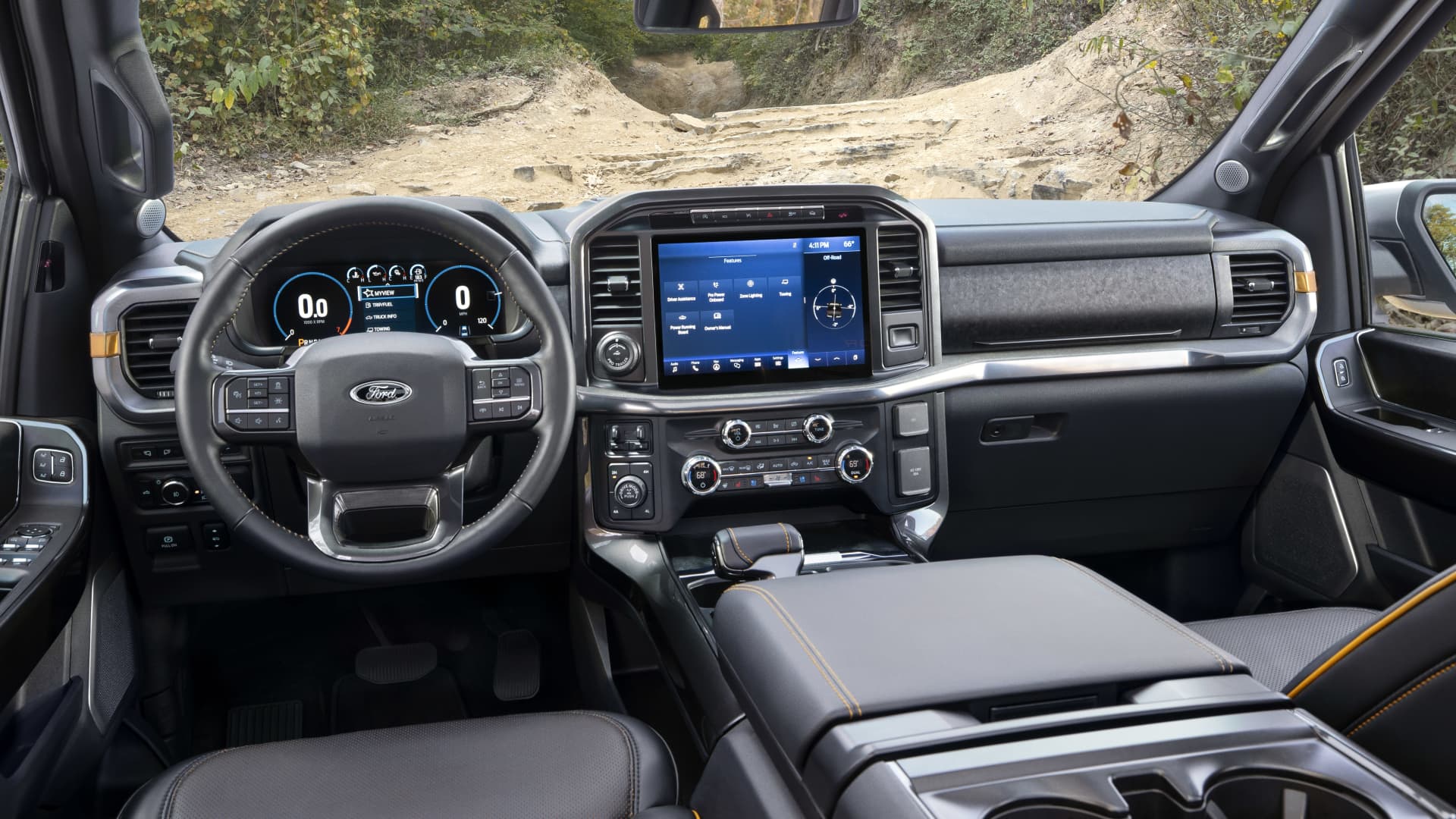
- Ford and Google are entering into a six-year deal, which the automaker said is worth hundreds of millions of dollars.
- The tie-up will make Google responsible for much of the automaker's growing in-vehicle connectivity, as well as cloud computing and other technology services.
- Google is expected to assist Ford with everything from in-car infotainment systems and remote, or over-the-air, updates to using artificial intelligence.
Ford andGoogle are entering a six-year deal that will make the tech giant responsible for much of the automaker's growing in-vehicle connectivity. Google will also provide cloud computing and other technology services.
The partnership announced Monday is designed to streamline Ford's operations and accelerate an ongoing $11 billion restructuring plan. It marks a major shift for the automaker, which has spent hundreds of millions of dollars annually in recent years to develop and maintain such systems.
It will also give Google a new marquee customer for its cloud computing technology, which lags behind rivals Amazon and Microsoft in market share, and shows how Google is willing to use assets such as its mobile dominance to help build its cloud business. The deal is not exclusive, allowing the companies to use other clouds or existing Ford data centers.
Shares of Ford jumped as much as 8.6% during intraday trading late-Monday morning. Shares of Google's parent company, Alphabet, were up about 3%.
Under the deal, Ford and Lincoln vehicles will sport Android, the Google Assistant, Google Maps and Google Play starting in 2023, and Google's cloud will enable other types of services. For instance, Google said Ford is looking to use the tech giant's cloud to enable a system for sending customers messages about maintenance or trade-in opportunities.
Google will also help Ford use artificial intelligence in areas such as supply chain logistics and manufacturing, the companies said.
Money Report
Ford CEO Jim Farley: Partnerships are key
The partnership is the most recent change for Ford under Jim Farley, who has restructured the automaker's operations and management team since becoming CEO in October. The company's stock is up about 60% under his tenure.
"One of the most important parts of our strategy is to partner," Farley told CNBC. "That means that we have to get out of the business of doing generic things that we do not add value, like navigation systems and a lot of the in-car entertainment experience."
He added, "We were spending hundreds and hundreds and hundreds of millions every year, keeping up with basically a generic experience that was not competitive to your cellphone."
Farley said the deal is worth "hundreds of millions" of dollars, but declined to provide a specific number.
Despite automakers like Ford spending significant capital to develop such systems, consumers have moved toward using Google's Android Auto or Apple's CarPlay programs while driving, according to industry groups such a J.D. Power. The programs mirror phone apps on in-vehicle infotainment screens, providing a more familiar interface for drivers.
Ford's largest crosstown rival, General Motors, announced a deal in 2019 to integrate Google's voice assistant and app ecosystem into its vehicles beginning this year. A GM spokesman confirmed those plans remain on track.
Ford's partnership with Google is broader than the GM-Google deal. Employees from both companies will be part of a new group called Team UpShift, which will use Google's services and data expertise to better streamline Ford's operations and create a more seamless experience for customers, Farley said.
Farley said Ford analyzed several companies before choosing Google. He said the automaker specifically liked Google's cloud services – an increasingly important technology for automakers as they begin updating vehicles remotely. Cellphone providers have remotely updated products for years, however automakers (other than Tesla) have been slow to adopt such practices.

Farley compared the company's opportunity to retain customers through in-car connectivity to cellphone providers and services such as Amazon Prime becoming so integrated in people's lives that they remain with a certain brand or product. Such services include predictive maintenance, apps and data utilization to allow companies to more regularly interact with customers after they purchase a vehicle.
"It's a tremendous opportunity. Bigger than electrification," Farley said. "All the digital capability and conductivity and the digital ecosystem outside of the vehicle are all coming together to a loyalty model, where people will have a much more difficult time switching brands."
A cloud win for Google
The cloud business win for Google is one that either Amazon or Microsoft could have picked up instead.
The more Google can expand in cloud computing, the less it has to lean on advertising, a business that showed vulnerability in 2020 when an 8% annualized decrease in Google advertising sales caused Alphabet's first-ever revenue decline in the second quarter of 2020.
Google aspires to become a larger force in the cloud market, where Amazon held 45% share and Microsoft had 18% in 2019, leaving Google with 5%, according to estimates from technology industry research company Gartner. In the third quarter of 2020, Google parent Alphabet said cloud revenue, including contributions from Google Workspace productivity software, was $3.44 billion, or 7% of revenue, while Amazon's Web Services cloud division generated $11.60 billion in revenue.
Ford has a history with the other two cloud vendors. Years ago, the company used Microsoft software to power its Sync in-car communications system, but after consumers encountered technical issues, Ford in 2014 switched Sync to BlackBerry's QNX.
In 2015 Ford committed to using Microsoft's Azure cloud to deliver software updates to vehicles, and Ford agreed to a multiyear deal with Amazon Web Services in 2019. Ford and Google did not immediately make clear exactly which cloud computing services from Microsoft and AWS would be replaced by Google services instead.
Google has looked to widen its cloud business by focusing on five industries, including manufacturing, since Oracle executive Thomas Kurian came to Google to lead its cloud efforts in 2019. Google has also sought to make inroads in media, entertainment and gaming. Last year when Google announced a deal with Activision Blizzard, it also said Google-owned YouTube was becoming the game developer's exclusive venue for streaming esports events.
"We always say, 'Hey, let's look at what problems we are trying to solve for the client,' and 'How do we think more broadly about that?'" said Thomas Kurian, CEO of Google's cloud unit, in an interview on Monday. "In some cases they want only the cloud portion from Google. In other cases, they want other aspects of Google."






